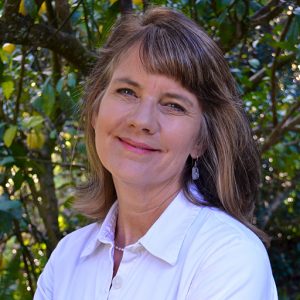Cynthia Barnett: “We Can Change and It’s Up to Us to Do So”
Cynthia Barnett Is the University of Florida College of Journalism and Communications and Bob Graham Center for Public Service Environmental Journalist-in-Residence. The National Book Award nominee’s writing wraps environmental insight in appealing packages from rain showers to seashells, while her teaching spans civics and storytelling.
What will you explore in your book about seashells?

“I try to think about ways to draw the public to the story of the planet, and seashells are something we’ve always wanted to listen to. It’s sort of irresistible to pick a shell up to the ear and listen to what it’s trying to tell us — and they are telling us a profound story about what we’re doing to the ocean. The tiniest shells are beginning to disintegrate in the acidifying sea. It really is a metaphor for something much bigger.”
Turning points:
Barnett looks to UF legends Archie Carr, who brought international attention to the plight of sea turtles, and Frank E. Maloney, the Levin College of Law dean who helped write Florida’s model land and water laws in the early 1970s, as inspirations who helped lead society toward a more sustainable future. “We have a role beyond the classroom and beyond any specific books we’re writing or research we’re doing to set a tone for how we can live differently in Florida, in the United States, in the world. We’ve had these turning points in Florida’s history where the university has been really important to changing the ethos. We’re in one of those times now.”
What gives you hope?
Barnett finds hope in the students who seek her out. At the Graham Center, she teaches Environmental Leadership through biography. In her Environmental Journalism course, students publish a project grounded in solutions. “If you look back over our environmental history, there are terrific stories of big things that we turned around. Acid rain was a global crisis that required international cooperation, and it did happen. Those are the things I want people to remember and feel inspired about. The story of humanity is the story of renewal and readjustment. It often takes us way too long, but it’s important to remind people that’s what we do, and that’s what we are doing now.”
Why do you write to “the caring middle”?
“We know on issues such as climate change, there’s a core group of deniers who are never going to change the way they think, and that’s ok, because that’s only 7 to 10 percent of the population. There’s a core group of super-worried people who know exactly what’s happening. Then there’s a really large group in the middle, and those are the people science tells us we need to reach to be able to make a difference. I try to think of ways to appeal to that group that I think of as the caring middle. That’s why I like to write about a seashell rather than the words ‘ocean acidification’ that are kind of hard for people to swallow.”
What impact would you like to have?
“I hope I can help inspire a new ethic for the way we live with water, the climate, our earth.”
Published in UF News’ “Creating the World to Come” series on Jan. 29.
Posted: January 30, 2019
Category: Alumni Profiles, College News
Tagged as: Cynthia Barnett, UF News


